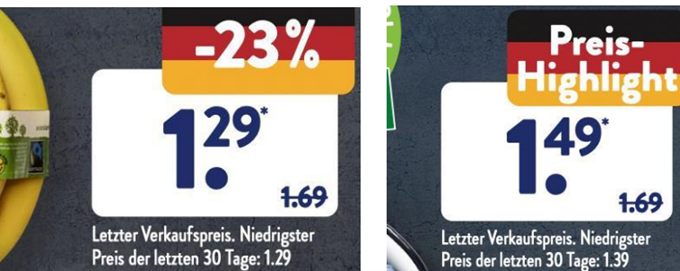Price reductions under CJEU scrutiny: What does the new judgment change for consumers and retailers?
On 26 September 2024, the Court of Justice issued a major ruling on consumer protection in the context of presentation of product prices and use of discounts in advertising campaigns. The judgment in C-330/23, Aldi Süd, will be crucial for businesses operating in the EU, including Poland.
In C-330/23, Aldi Süd, the German grocery chain Aldi Süd prepared weekly advertising brochures that included offers from different branches of the group. Available both in print and online, these brochures included “super promotions” on fresh foods at discounted prices.
A special price offer on organic bananas and pineapples was advertised in the brochure for the week of 17–22 October 2022. The prices of these products were presented as follows:

Thus the following information could be gleaned from the presentation:
- Organic bananas:
- The selling price of bananas after the discount was EUR 1.29/kg
- The previous price, struck out, was EUR 1.69
- The percentage reduction was ˗23%
- The lowest price over the last 30 days was EUR 1.29
- Pineapples:
- The selling price was EUR 1.49 per item
- The previous price, struck out, was EUR 1.69
- This was a “price highlight”
- The lowest price over the last 30 days was EUR 1.39.
The regional consumer association Verbraucherzentrale Baden-Württemberg accused the retailer of misleading consumers with these ads, and harming consumer interests. It argued that:
- If the reductions are expressed as percentages, they must refer to the lowest price in the last 30 days before the reduction (in other words, the percentage reduction should be calculated from that price, and thus in the case of bananas, the ˗23% reduction should be calculated from the price of EUR 1.29/kg (the lowest in the previous 30 days), and not, as was the case for the organic banana offer, from the price immediately before the reduction, i.e. EUR 1.69/kg
- It is unlawful to advertise a price reduction for products, and label it as a “price highlight,” if the price indicated as a “price highlight” is higher than the lowest price from the last 30 days before the reduction, as in the case of the pineapple offer.
Answering the questions referred to it for a preliminary ruling by the German court hearing the case, the Court of Justice held that
“a price reduction of a product announced by a trader in the form of a percentage, or in the form of a promotional statement intended to highlight the advantageous nature of the announced price, must be determined on the basis of the ‘prior price’” within the meaning of Art. 6a(2) of Directive 98/6/EC, i.e. “the lowest price applied by the trader during a period of time not shorter than 30 days prior to the application of the price reduction.”
Key conclusions flowing from the judgment:
- Any advertisements for price reductions must refer to the lowest price in force in the last 30 days before the price reduction was applied
- Businesses are prevented from misleading consumers by increasing the applied price before the price reduction is announced and thereby presenting false price reductions.
This means that retailers must:
- Monitor their prices closely
- Avoid price manipulation before introducing reductions
- Conduct advertising campaigns as transparently as possible
- Apply reductions in accordance with the above interpretation of the provisions to avoid any sanctions.
However, this judgment should not come as a surprise to businesses operating on the Polish market. With regard to the presentation of percentage price reductions based on the lowest price from 30 days before the reduction, it coincides with the guidance published by the president of the Office of Competition and Consumer Protection (UOKiK). In turn, the position of the Court of Justice, according to which the selling price of a product presented in an advertisement as a reduced price may not be the same as or even higher than the lowest price from 30 days before the reduction, is consistent with the approach of the Polish regulator presented in the proceedings against AzaGroup (owner of online shops Renee.pl and Born2Be.pl). In the press coverage of the proceedings, the Polish regulator stated:
“It is also questionable whether the owner of the Renee and Born2Be shops can offer products as ‘promotional’ when their price has not changed, or has even increased, in relation to the lowest price in force during the 30 days prior to the reduction. A promotion is truly a promotion if the product has been sold at a higher price in the last 30 days. Otherwise, use of the words ‘sale,’ ‘promotion’ or ‘reduction’ may be improper. If the previous price does not deviate from the current price, a price advantage cannot be considered to have occurred. The correct way to calculate the discount is to relate the current selling price to the lowest price of the product over the last 30 days.”
Agnieszka Jelska, attorney-at-law, Tomasz Kisiel, Competition & Consumer Protection practice, Wardyński & Partners

